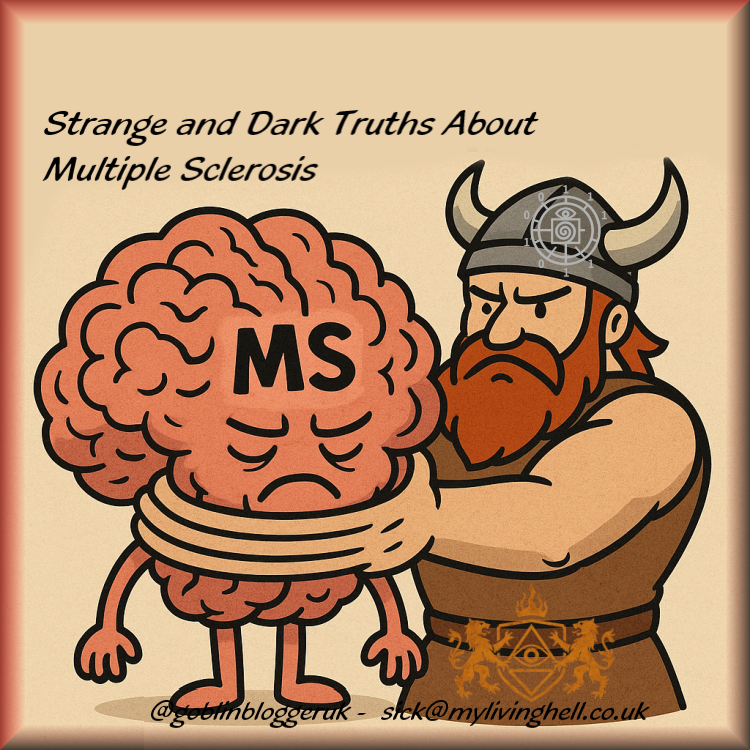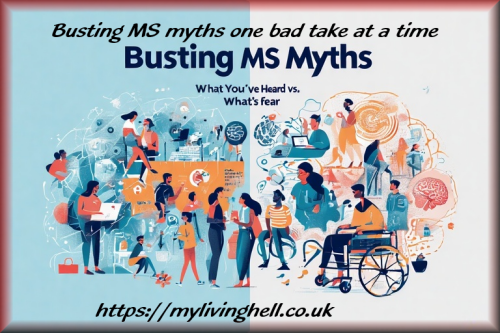- Posted on
⚠️ Please read with care: This blog shares personal, sometimes painful experiences. My intention is to support and speak honestly not to harm. I’m not a professional, just someone who understands how hard it can get. If you're struggling, you're not alone please reach out for professional help.
Let’s strip away the polite medical brochures and glossy pharma ads. Multiple sclerosis isn’t some neatly packaged “condition” with smiling stock photos. It’s a dark, unpredictable bastard of a disease that wrecks the nervous system and leaves lives littered with scars—both visible and invisible. This isn’t the inspirational poster version. This is MS with the lights off.
The Viking Curse MS is more common the farther you live from the equator. Scientists think genetics and sun exposure play roles, but there’s a darker, almost mythic twist: some believe the Vikings carried and spread the genes for MS as they plundered their way across Europe. So if you’ve got Northern blood, your inheritance might not just be a proud family tree it might be a nervous system that self-destructs like a berserker on a bad day.
Latitude Lottery Born near the equator? Lower odds of MS. Born in the dim, cold north? Welcome to the danger zone. Vitamin D deficiency from lack of sunlight is a prime suspect. It’s cosmic irony: the very people starved of sunlight are the ones who need it most, cursed by geography to battle their own bodies.
The Epstein–Barr Smoking Gun Almost everyone with MS has had Epstein–Barr virus (EBV). You know, “the kissing disease.” Turns out a teenage snog-fest or bout of fever might set you up for a lifetime of neurological sabotage. Imagine that: one sweaty house party in 1983 and boom, 40 years later your immune system is gnawing on your spinal cord like it’s an all-you-can-eat buffet.
Rewiring the Brain The human brain is stubborn. When MS burns holes in the circuitry, the brain reroutes signals like a city trying to drive around craters after an air raid. For a while, it works. But eventually, the map falls apart. What was once clever detours becomes a city in ruins, where the traffic lights blink for no one.
Saint of the Falling Sickness The earliest known MS patient was Lidwina of Schiedam, a Dutch woman in the 1300s. She became paralyzed, lost her sight, and suffered relentless relapses. The church, in its usual twisted way, decided this was saint material. So now she’s the Patron Saint of ice skaters and the chronically ill. If sainthood is the consolation prize for decades of agony, no thanks.
Seasons of Relapse MS relapses love spring and summer. While the world bursts with life, your nervous system decides to collapse like a drunk uncle at a barbecue. Some say vitamin D fluctuations, some say infections, but really, MS just has terrible timing.
Life, Shortened MS doesn’t kill you quickly. It’s more like being forced to live with Death as a flatmate. Average life expectancy drops by 7–10 years, but the real torture is the decades spent watching your body betray you bit by bit. Death isn’t the horror here—it’s the endless rehearsal.
The Hug That Suffocates The infamous “MS Hug” sounds comforting, but it’s more like a python crushing your ribs from the inside. Imagine being gripped by an invisible straightjacket made of fire. It’s the worst Hallmark card sentiment ever: “Hugs, from your disease.”
Brain in Shrink-Wrap MS accelerates brain shrinkage, years faster than normal aging. Picture your thoughts, memories, and personality being slowly vacuum-sealed while you’re still alive. It’s not just neurological—it’s existential taxidermy.
MS isn’t neat. It isn’t poetic. It’s a horror show played out in slow motion, starring your nervous system. And yet, here’s the kicker: people keep going. They laugh, they fight, they even blog about it. Because what’s darker than MS itself? The fact that human beings can stare this monster down and keep dragging themselves forward anyway.
I write in ink and fury, in breath and broken bone.
Through storm and silence, I survive. That is the crime and the miracle.

